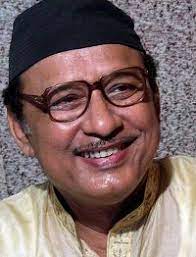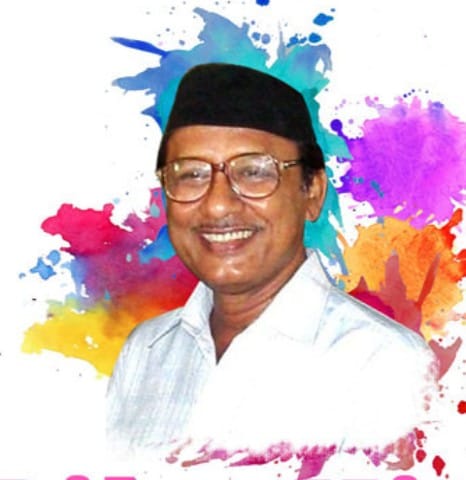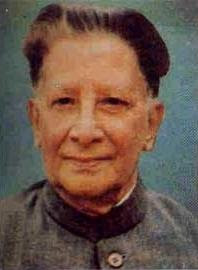Khagen Mahanta, fondly remembered as the “Bihu Samrat” (King of Assamese Bihu Songs), was a renowned figure in Assamese folk music. He was born on August 17, 1942, at Aamtala Gajala Satra near Jajari Borguri in Nagaon district, Assam. His parents were Harendranath Mahanta and Lakshmipriya Devi. The Satras, where he was born, are spiritual institutions established by the great saint Srimanta Sankardeva, which played a significant role in shaping his early connection to Assamese culture.

Early Life and Passion for Music
Khagen Mahanta discovered his love for music at an early age. By the time he was 15, he was already performing in music concerts in Shillong, which was then the undivided capital of Assam. He showed an inclination toward Assamese folk music, including Bihu songs, Borgeet, and various other traditional tunes that became his lifelong passion.In 1957, after passing matriculation from Nagaon Government High School, he joined St. Edmund’s College in Shillong. He achieved remarkable recognition in 1959 by winning a gold medal in the Inter-University Youth Festival for his khul playing (a two-sided drum played with the hands). During the same year, he made his debut performance on Delhi Doordarshan, impressing audiences across India. Despite his academic endeavors at Guwahati University, where he studied in the English and History departments, his love for music became his primary focus, and he chose to dedicate his life to preserving and promoting Assamese folk music.
Contributions to Assamese Folk Music
Khagen Mahanta’s career took off with the release of his first gramophone-recorded song in 1961, which was broadcast from the All India Radio (AIR) Guwahati center. He became an integral part of the Assamese cultural movement, actively participating in events like the World Peace Festival in Kolkata (1961) and a cultural exchange program in Nepal (1965). His role during Assam’s 1960 language movement as a member of the Harmony Group, alongside stalwarts like Bishnuprasad Rabha and Hemanga Biswas, showcased his commitment to using music as a medium to promote harmony and human values.Khagen Mahanta’s music wasn’t limited to just Bihu songs. He also worked tirelessly to preserve other traditional Assamese music forms, such as Borgeet, Goxha, and Biya Naam (wedding songs). In collaboration with his wife, Archana Mahanta, a fellow folk singer and actress, he popularized Bihu songs both within Assam and beyond. Together, they became cultural icons of the state.
Recognition and Achievements
Khagen Mahanta’s contributions to music earned him numerous accolades throughout his career:
- Sangeet Natak Akademi Award (1992) – One of the highest honors in the field of performing arts in India.
- Title of Sangeetacharya, recognizing his mastery in music.
- Film Craft Award and Shrimoy Award for his outstanding contributions.
His long association with All India Radio Guwahati further solidified his role as a music director and composer, where he served from 1976 to 1986. He was deeply respected for his calm demeanor, dedication to his craft, and commitment to Assamese culture.
Personal Life and Legacy
In 1973, Khagen Mahanta married Archana Mahanta, and the couple had two children: Papon (Angaraag Mahanta), who is a celebrated singer in India, and Kingkini Mahanta. The family’s legacy continues through Papon, who has brought Assamese music to a global platform.Khagen Mahanta passed away unexpectedly on June 12, 2014, at his residence in Nigaji Paam, Guwahati. His death marked the end of an era in Assamese music, but his contributions continue to inspire generations of artists.
What Makes This Story Unique?
Unlike many websites, our content emphasizes the cultural depth and historical significance of Khagen Mahanta’s journey. We provide specific details, such as his participation in the 1960 language movement, his performances in international festivals, and his dedication to preserving Assamese folk traditions. This approach ensures students get a comprehensive understanding of his life and impact, making our content both engaging and informative.
FAQs
Q 1. Who was Khagen Mahanta, and why is he called the “King of Bihu”?
Khagen Mahanta was a legendary Assamese folk singer, lyricist, and composer, popularly known as the “King of Bihu” for his significant contributions to Assamese folk music, particularly Bihu songs.
Q 2. What are the notable awards received by Khagen Mahanta?
He was honored with the Sangeet Natak Akademi Award (1992), the prestigious title of Sangeetacharya, the Film Craft Award, and the Shrimoy Award for his outstanding contributions to music and Assamese culture.
Q 3. What role did Khagen Mahanta play in preserving Assamese folk traditions?
Khagen Mahanta dedicated his life to preserving and popularizing Assamese folk traditions, particularly through Bihu music, ballads, and folk songs that celebrated Assamese culture and heritage.
Q 4. Who are the family members of Khagen Mahanta?
Khagen Mahanta married Archana Mahanta, a renowned Assamese singer, and they had two children: Angaraag Mahanta (Papon), a celebrated Indian singer, and Kingkini Mahanta.
Q 5. How did Khagen Mahanta contribute to All India Radio Guwahati?
From 1976 to 1986, Khagen Mahanta served as a music director and composer at All India Radio Guwahati, where he further enriched Assamese music.
Q 6. What is the significance of Khagen Mahanta’s role in the 1960 Assam language movement?
Khagen Mahanta actively participated in the Assam language movement, using his art to advocate for Assamese cultural identity and its preservation.
Q 7. How has Khagen Mahanta’s legacy been carried forward by his family?
His son, Papon (Angaraag Mahanta), continues his legacy by bringing Assamese music to global platforms, introducing it to newer audiences while blending traditional and modern styles.
Q 8. What is Khagen Mahanta’s connection to international music festivals?
Khagen Mahanta performed in various international festivals, showcasing Assamese folk music on a global stage and highlighting its rich cultural roots.
Q 9. When did Khagen Mahanta pass away, and what was the impact of his death?
Khagen Mahanta passed away on June 12, 2014, at his residence in Nigaji Paam, Guwahati. His death marked the end of an era in Assamese music, but his contributions remain a source of inspiration for generations.
Q 10. What makes Khagen Mahanta’s story unique?
Khagen Mahanta’s story stands out due to his unwavering dedication to Assamese folk traditions, his role in significant cultural movements, and his ability to connect Assamese music with global audiences while maintaining its authenticity.











